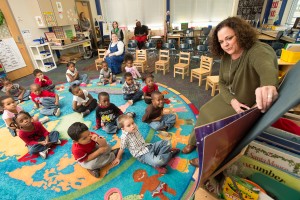Small talk makes a big difference in a child's early development
- September 30, 2015
- / Reggie Dogan
- / education

“Education,” Nelson Mandela declared in a speech to college graduates in 2003, ‘is the most powerful weapon which you can use to change the world.”
But all too often the condition of some children — and their future role in society — is determined long before their first day of kindergarten.
By the time poor children are 3 years old, researchers believe they have heard on average about 30 million fewer words than children the same age from better-off families, setting back their vocabulary, cognitive development and future reading skills before the first day of school.
Those children who experience this drop in heard words are put at a disadvantage before they ever step in a classroom.
Dr. Dana Suskind, founder and director of the Thirty Million Words Initiative, learned of this thirty million-word gap in the course of her work as a cochlear implant surgeon at the University of Chicago Medical School.
Bolstered by the knowledge that each parent holds the key to their child’s optimum brain development — and most don’t even know it — Suskind began a new research program to find the best ways to bridge that gap.
In her new book released this month, “THIRTY MILLION WORDS: Building a Child’s Brain,” Suskind shows clearly how parents can put into practice the core strategies of the Thirty Million Words Initiative — which can be codified by the three T’s:
- TUNE IN to what your child is doing
- TALK MORE to your child using lots of descriptive words
- TAKE TURNS with your child as you engage in conversation
Early education plays a critical role during the important developmental years of a child. Kindergarten readiness, in fact, is one of the 16 key metrics the Studer Institute uses to measure the economic, educational and social well being in the Pensacola metro area.
There is little debate over the fact that all children deserve the chance to reach their fullest potential.
While traditional thought has said this begins on the first day of school, science tells us something different.
It says that if we want our children to be all they can be, intellectually, productively, creatively, we must begin to recognize that the ultimate achievement begins on the first day of life and that parents must be recognized as the critical link.
Suskind’s findings are based on scientific research showing the vital importance of early language exposure on the developing child.
It also provides tools for parents to enhance their home language environment in order to improve their child’s brain development, and invariably his or her ability to learn.
 CivicCon launches with a look at good growth in cities
CivicCon launches with a look at good growth in cities
 Building stronger brains one baby, one parent at a time
Building stronger brains one baby, one parent at a time
 SCI debuts commercial on Early Learning City
SCI debuts commercial on Early Learning City
 Entrecon: World class speakers and an opportunity to sharpen skills
Entrecon: World class speakers and an opportunity to sharpen skills
 PYP Quality of Life survey 2017
PYP Quality of Life survey 2017
 EntreCon Pensacola 2016: A look back
EntreCon Pensacola 2016: A look back
 Leadership tip: getting better employee takeaways
Leadership tip: getting better employee takeaways
 Leadership tip: be interested instead of interesting
Leadership tip: be interested instead of interesting
 Leadership tip: delivering difficult messages
Leadership tip: delivering difficult messages
 Brain Bags boost Arc, Early Childhood Court programs
Brain Bags boost Arc, Early Childhood Court programs